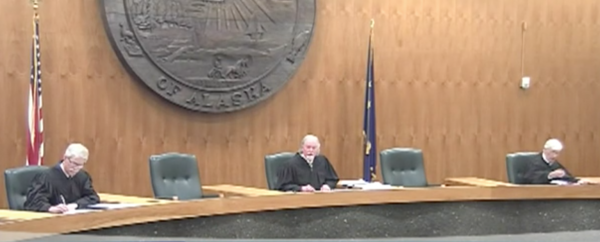
The Alaska Supreme Court heard oral arguments on Wednesday on the case over the proposed recall of Gov. Mike Dunleavy. The justices expressed some skepticism toward the arguments made by both sides.
The justices were hearing an appeal filed by the state Division of Elections of a Superior Court decision in favor of Recall Dunleavy. That decision allowed the recall campaign to begin gathering signatures in February to hold a recall election.
Due to the coronavirus outbreak, three justices sat at least six feet apart from each other, with Justices Daniel Winfree and Susan Carney — as well as the lawyers — participating by phone.
Assistant Attorney General Margaret Paton-Walsh argued that the recall committee didn’t meet the grounds for recall under state law.
She said if Dunleavy could be recalled for failing to appoint a judge in 45 days, then any governor could be recalled for violating any law. Justice Craig Stowers pushed back:
Paton-Walsh: “If the governor could be subject to recall every time any time anybody thinks that he’s violated a law —”
Stowers: “But that’s not what we’re talking about, really. We’re talking specifically about the statutory requirement to appoint a judge within 45 days, which has been subject to some investigation and controversy.”
At another point, Paton-Walsh focused on another of the listed grounds for recall: Dunleavy’s mistaken veto of $18 million in Medicaid funding, which was later fixed.
“The statutory scheme requires some sort of explanation, not just for a set of facts to be thrown out to hang there while people try to figure out why this particular allegation constitutes neglect of duty or lack of fitness,” she said.
Former Alaska Attorney General Jahna Lindemuth argued the case for Recall Dunleavy.
She noted that many thousands of people must sign both the recall application and the petition to have an election.
“This is already a difficult process,” she said. “And this administration seeks to make it an impossible task, by adding artificial technical hurdles that this court warned should not be imposed by the judiciary. If this administration wants to change how recall is conducted in Alaska, to make it more protective of officials, it can seek a legislative change.”
Justices raised the possibility that some legal violations could be so trivial as to not rise to the level of subjecting an official to recall. And Carney asked if any mistake could subject a governor to recall.
Lindemuth said that’s not Recall Dunleavy’s position.
“What we’re saying is that it has to be a serious mistake that’s outside the discretion allowed by law,” she said.
Chief Justice Joel Bolger recused himself from the case. Retired Justice Robert Eastaugh replaced him.
It’s not clear how quickly the court will rule. The recall campaign said on March 20 it had gathered 40% of the more than 71,000 signatures needed to hold an election.
Andrew Kitchenman is the state government and politics reporter for Alaska Public Media and KTOO in Juneau. Reach him at akitchenman@alaskapublic.org.




